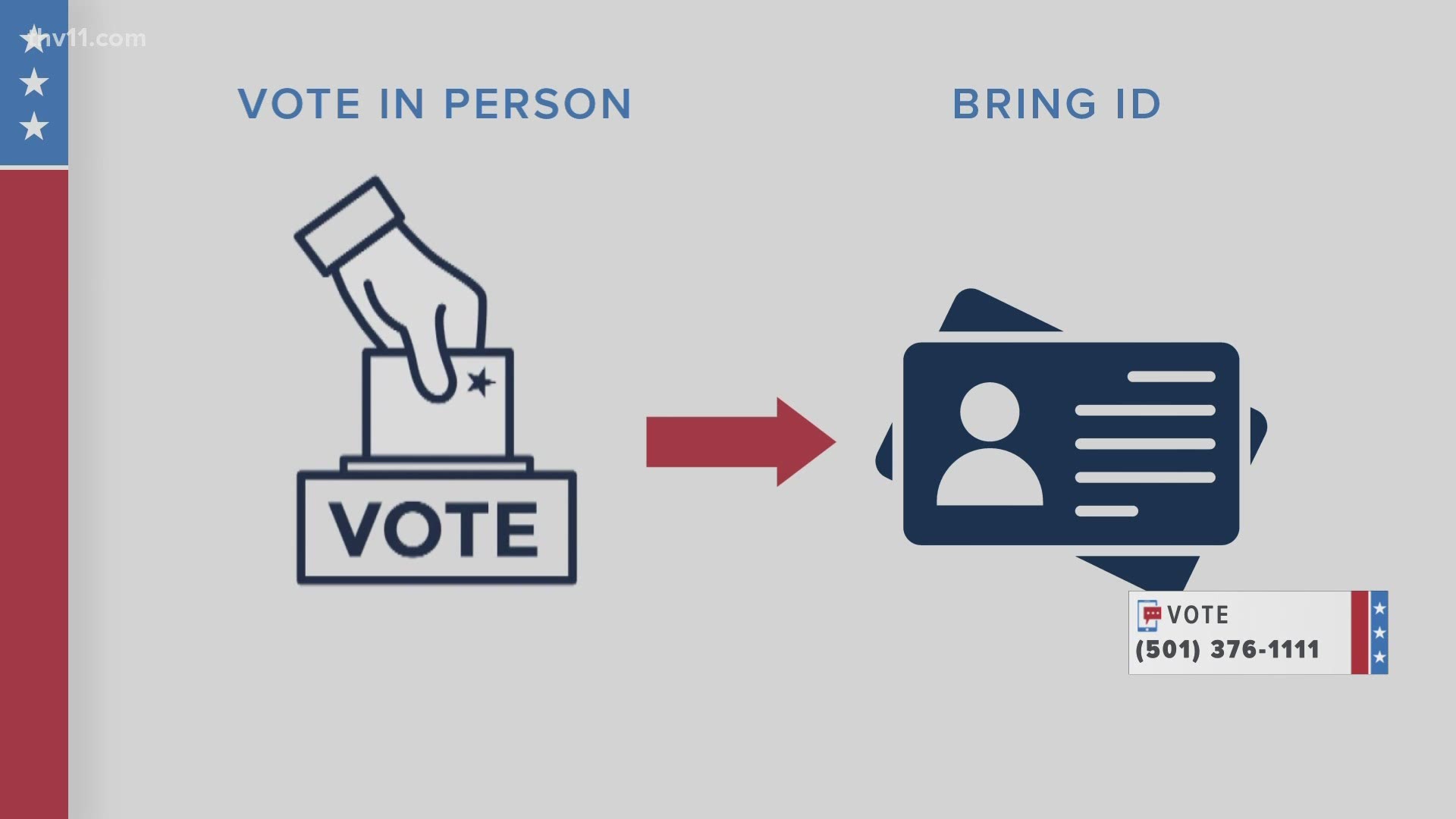Everything you need to know about the 2020 elections in Arkansas
From an Arkansas voter guide to explaining how absentee ballots work, here's all the information you need to know about the upcoming election in Arkansas.

The 2020 general election is scheduled to take place on November 3. Below, you will find a voter guide for information on candidates, ballot issues, voting, and other key dates in Arkansas.
In this article, topics include:
- How to vote & deadlines
- Learn about key races
- Ballot measures
- Where to find election results
How to vote How to vote
You can choose to vote with an absentee ballot, during the early voting period or in-person.
The deadline to request an absentee ballot is Tuesday, October 27. You can turn that in the day before the election to your county clerk or by mail by 7:30 p.m. on election day.
You can list COVID-19 as a valid excuse to request an absentee ballot.
When does early voting start in Arkansas?
Early voting begins on Monday, October 19 and lasts until Monday, November 2.
If you are still in line to vote when the polls close at 7:30 p.m. you can still vote.
For more information on voting and deadlines, click here.
Key races to watch Key races to watch
U.S. House races
First Congressional District
Congressman Rick Crawford (R) is running unopposed in the 2020 elections for the 1st congressional district seat.
Second Congressional District
Congressman French Hill (R) has held the 2nd congressional district seat since 2014 and was re-elected in 2016 and 2018.
In 2018, he won roughly 52% of the vote against Democratic candidate Clarke Tucker. Hill won six of the seven counties in the district, but lost Pulaski County with only 38.89% of the vote.
He is being challenged by Joyce Elliott (D), who has been in the Arkansas Senate since 2009. She previously challenged for the 2nd congressional district seat in 2010 and received 38.27% of the vote.
If elected, Elliott would become the first Black person from Arkansas elected to Congress. She was endorsed by former President Barack Obama in August.
A recent Talk Business & Politics poll showed Hill with only a 1.5-point lead over Elliott and another showed the two were tied.
Third Congressional District
Congressman Steve Womack (R) is being challenged by Celeste Williams (D) and Michael Kalagias (L).
Fourth Congressional District
Congressman Bruce Westerman (R) is being challenged by William Hanson (D) and Frank Gilbert (L).
U.S. Senate race
Republican Senator Tom Cotton is hoping to be re-elected after being elected to the Senate seat in 2014 when he won 56% of the vote.
Cotton has made national news quite a few times this election cycle, including saying that "it's time for Roe v. Wade to go" after being named a potential Supreme Court nominee.
There is no Democratic candidate on the ballot after Josh Mahony exited the race two hours after the filing period deadline passed.
The only challenger to unseat Cotton is Libertarian candidate Ricky Harrington Jr. His campaign is focused on criminal justice reform and healthcare.
"I'm not in this for glory and I'm not in this to make a huge name for myself," Harrington told us. "I'm in this to wake up the people, so they can take back their republic."
Independent Dan Whitfield tried to get his name on the ballot, but ultimately dropped out after he failed to get his name on the ballot.
Presidential Race
Republican President Donald Trump is hoping to be re-elected for a second term after winning in 2016 with 304 electoral votes. He didn't win the popular vote against Hillary Clinton, receiving only 46.1% of the vote.
He is being challenged by Democratic candidate Joe Biden, who has chosen Kamala Harris as his Vice President candidate.
According to FiveThirtyEight, Biden holds a 8.5-point lead over Trump in national polls. In its election forecast, FiveThirtyEight said Biden is currently favored to win the election in November.
In the latest Arkansas poll, Trump had overwhelming support among respondents with 65% support. Biden had 32% support among those polled.
In a poll of Arkansans in the second district, Biden held a 4-point lead over Trump.
Ballot measures Ballot measures
Issue No. 1
An amendment to the Arkansas Constitution to continue a half-percent (0.5%) sales tax for state highways and bridges, county roads, bridges, etc. Read the full issue.
What does your vote mean?
For: You vote to raise the sales tax for state infrastructure projects.
Against: You vote against raising the sales tax.
Supporters of Issue No. 1 say:
- The tax will support 3,600 jobs and provide over $8 billion over 10 years.
- Helps pay for highways, bridges, etc. without creating a new tax; it is just adding to one that already exists.
Opponents of Issue No. 1 say:
- Arkansas Department of Transportation cannot oversee how many state transportation infrastructure that it has, and there will never be enough money to cover it all.
- A large portion of the funds will go to a project just in Little Rock, which will benefit a small group of residents in the state. ARDOT is currently being sued in state and federal courts for violating environmental and planning regulations on the particular project.
Issue No. 2
An amendment to the Arkansas Constitution to amend the term limits to twelve consecutive years for state legislators with the opportunity to return after a four-year break. Read the full issue.
What does your vote mean?
For: You vote to take away lifetime term limits for legislators, limiting their terms to 12 consecutive years when they're elected after 2020, and if they reach 12 years, they have to wait four more years to run again.
Against: You vote to maintain the current lifetime term limits of serving up to 16 years in the House.
Supporters of this amendment say:
- If you believe the government should be run like a business, it wouldn't make sense to fire the leadership of business after 12 years.
- Gives elected officials time to be experienced while still keeping term limits short enough.
Opponents of this amendment say:
- Actually extends term limits because it allows current legislators serving 16 years to sit out for four years after they reach the and then can run again for an additional 12 years.
- This removes the current limit and allows them to return just four years later.
Issue No. 3
A constitutional amendment to amend the process that goes into the submission, challenge, and approval of proposed legislation. Read the full issue.
What does your vote mean?
For: You vote to move dates when voter petitions are due, increasing the number of counties where voter signatures must be collected for all citizen-initiated petitions, etc.
Against: You vote not to change the current guidelines on the submission. challenge and approval of proposed legislation.
Supporters of Issue No. 3 say:
- Under the current guidelines, out-of-state interest groups have bought signatures in parts of the state with large populations with one predominant political ideology.
- The Arkansas Constitution is sacred and should not be easily changed by out of state interest groups.
Opponents of Issue No. 3 say:
- These measures makes it difficult to get citizen-led petitions on the ballot.
- If the supporters of the amendment really cared about changing the constitution, they would make it harder to refer amendments within the Arkansas House legislature, which is where 80% of amendments originated.
Issue No. 6
An act to amend the definition of "practice of optometry," in an effort to allow optometrists to perform surgery. Read the full issue.
On Sept. 17, this issue was blocked by the Arkansas Supreme Court in a 6-1 ruling. Justices said the campaign didn't comply with a law regarding background checks on paid canvassers.
What does your vote mean?
For: You vote to have a law that was passed in 2019 to go in effect that allows optometrists to perform some procedures that could only be done by an ophthalmologist.
Against: You vote to not pass the law and to keep the current definition of optometry as it is.
Supporters of Issue No. 6 say:
- The passage of the law would expand quality healthcare to Arkansans and at a generally lower cost.
- Doctors of optometry are educated to provide these procedures and are done without the use of general anesthesia.
Opponents of Issue No. 6 say:
- The law gives doctors who have no surgical training the right to perform eye surgery.
- Arkansan's eyesight will be put in jeopardy when doctors who are untrained to give surgical procedures are given the freedom to do so.
(Source: Arkansas Secretary of State, Public Policy Center at University of Arkansas Division of Agriculture)
Election results Election results
Click here to view live election results on November 3!
We will update this article as we get closer to election night on November 3.


